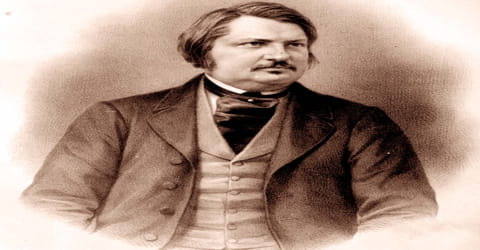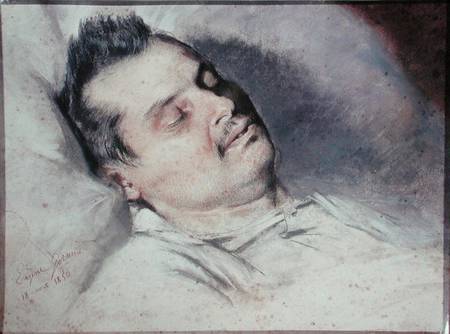Exploring Balzac's Legacy: A 19th-Century Literary Mastermind.
 Honore de Balzac, the renowned French novelist and playwright, stands as one of the most influential figures in 19th-century literature. Born on May 20, 1799, in Tours, France, Balzac's works are celebrated for their keen insights into human nature, intricate characterizations, and vivid portrayal of French society during the tumultuous period of the early 19th century.
Honore de Balzac, the renowned French novelist and playwright, stands as one of the most influential figures in 19th-century literature. Born on May 20, 1799, in Tours, France, Balzac's works are celebrated for their keen insights into human nature, intricate characterizations, and vivid portrayal of French society during the tumultuous period of the early 19th century.
Balzac's literary career began in earnest in the 1820s, with his early works showcasing his talent for crafting vivid characters and immersive settings. However, it was his ambitious project, "La Comédie Humaine" (The Human Comedy), that would cement his reputation as one of the greatest novelists of his time. Comprising over ninety novels and novellas, "La Comédie Humaine" offers a panoramic view of French society, spanning multiple generations, social classes, and professions. At the heart of Balzac's sprawling narrative is his exploration of the human condition and the forces that shape individuals and societies. Through his richly drawn characters and intricate plots, Balzac delves into themes such as ambition, desire, greed, and the pursuit of power, offering a nuanced and often unflinching portrayal of the complexities of human nature.
At the heart of Balzac's sprawling narrative is his exploration of the human condition and the forces that shape individuals and societies. Through his richly drawn characters and intricate plots, Balzac delves into themes such as ambition, desire, greed, and the pursuit of power, offering a nuanced and often unflinching portrayal of the complexities of human nature.
One of Balzac's most enduring works is "Le Père Goriot" (Father Goriot), published in 1835. Set in Paris during the Bourbon Restoration, the novel follows the intertwined fates of several characters, including the impoverished former merchant Goriot and the ambitious social climber Eugène de Rastignac. Through their struggles and aspirations, Balzac paints a vivid portrait of Parisian society, exposing the corruption, hypocrisy, and moral decay that lurk beneath its glittering surface.
Similarly, in "Lost Illusions" (1837-1843), Balzac offers a scathing critique of the literary and journalistic worlds, exploring the dangers of ambition, vanity, and deception. The novel follows the rise and fall of the aspiring writer Lucien de Rubempré as he navigates the treacherous waters of Parisian literary society, ultimately succumbing to the allure of fame and fortune at the expense of his integrity and self-respect.
Balzac's keen observations of society and human nature extended beyond the confines of the novel to encompass essays, articles, and journalistic pieces. His "Scènes de la vie privée" (Scenes from Private Life) and "Scènes de la vie de province" (Scenes from Provincial Life) offer a vivid snapshot of French society, capturing the hopes, dreams, and struggles of ordinary people in the rapidly changing landscape of 19th-century France. In addition to his literary achievements, Balzac's influence on the development of the modern novel cannot be overstated. His innovative approach to narrative structure, character development, and social commentary laid the groundwork for future generations of writers, including Gustave Flaubert, Emile Zola, and Marcel Proust, who would build upon his legacy and push the boundaries of literary realism and naturalism.
In addition to his literary achievements, Balzac's influence on the development of the modern novel cannot be overstated. His innovative approach to narrative structure, character development, and social commentary laid the groundwork for future generations of writers, including Gustave Flaubert, Emile Zola, and Marcel Proust, who would build upon his legacy and push the boundaries of literary realism and naturalism.
Furthermore, Balzac's impact on popular culture and the arts continues to be felt to this day. His works have inspired numerous adaptations for the stage, screen, and television, as well as countless homages and references in literature, music, and visual art. From the operatic adaptation of "Le Père Goriot" by Gaetano Donizetti to the film adaptations of "La Cousine Bette" and "César Birotteau," Balzac's stories continue to re sonate with audiences around the world, attesting to their enduring relevance and universal appeal.
sonate with audiences around the world, attesting to their enduring relevance and universal appeal.
In conclusion, Honore de Balzac's contributions to literature and culture are immense, his works continue to be celebrated for their incisive social commentary, rich characterizations, and immersive storytelling. As we continue to explore the intricacies of his "Comédie Humaine" and delve into the lives of his unforgettable characters, we are reminded of the enduring power of literature to illuminate the human experience and provoke thought, discussion, and reflection. Balzac's legacy as one of the greatest novelists of the 19th century lives on, inspiring writers and readers alike with his timeless tales of love, ambition, and the complexities of the human soul.
Certainly, let's delve deeper into Honore de Balzac's life, influences, and lasting impact.
Balzac's literary career was characterized by an insatiable appetite for writing and a relentless pursuit of perfection. He was known for his rigorous work ethic, often writing for long hours into the night and consuming copious amounts of coffee to fuel his creative endeavors. Balzac's dedication to his craft was matched only by his ambition to create a comprehensive portrait of French society, one that would capture the essence of its people, culture, and history.
Central to Balzac's vision was his belief in the interconnectedness of all aspects of human experience. In "La Comédie Humaine," he sought to explore the myriad ways in which individuals are shaped by their social milieu, economic circumstances, and personal ambitions. From the aristocratic salons of Paris to the bustling streets of the provinces, Balzac's canvas was vast and varied, offering readers a multifaceted glimpse into the lives of his characters and the world they inhabited.
Balzac's approach to characterization was equally ambitious, with each of his novels populated by a diverse cast of characters drawn from all walks of life. Whether it was the idealistic young poet, the ambitious social climber, or the world-weary aristocrat, Balzac's characters were richly drawn and multidimensional, reflecting the complexities of the human psyche and the contradictions of the human condition. Moreover, Balzac's use of recurring characters and interconnected storylines throughout "La Comédie Humaine" served to create a sense of continuity and cohesion across his body of work. Characters from one novel would often reappear in another, providing readers with glimpses into their ongoing struggles, triumphs, and transformations. This narrative technique not only enriched the reading experience but also reinforced Balzac's vision of a unified and interconnected world.
Moreover, Balzac's use of recurring characters and interconnected storylines throughout "La Comédie Humaine" served to create a sense of continuity and cohesion across his body of work. Characters from one novel would often reappear in another, providing readers with glimpses into their ongoing struggles, triumphs, and transformations. This narrative technique not only enriched the reading experience but also reinforced Balzac's vision of a unified and interconnected world.
Balzac's influence extended beyond the realm of literature to encompass philosophy, sociology, and even economics. His writings on the nature of desire, the pursuit of wealth, and the dynamics of power and influence anticipated many of the insights later developed by thinkers such as Karl Marx, Max Weber, and Emile Durkheim. Balzac's holistic approach to storytelling and his ability to capture the complexities of social life made him a pioneer of the realist tradition and a precursor to the modern novel.
Despite his literary success, Balzac's personal life was marked by turmoil and tragedy. He struggled with financial difficulties throughout his career, often living beyond his means and accruing massive debts in the process. His relationships were similarly tumultuous, marked by infidelity, divorce, and heartbreak. Balzac's own experiences of love and loss undoubtedly informed his writing, adding depth and authenticity to his portrayals of human relationships and emotions. In conclusion, Honore de Balzac's legacy as one of the greatest novelists of the 19th century is a testament to his unparalleled talent, ambition, and vision. His monumental work, "La Comédie Humaine," remains a towering achievement in the annals of literature, offering readers a panoramic view of French society and the human condition. As we continue to explore the intricacies of Balzac's world and the lives of his unforgettable characters, we are reminded of the enduring power of literature to illuminate, provoke, and inspire. Balzac's legacy lives on, inspiring writers and readers alike with his timeless tales of love, ambition, and the complexities of the human soul.
In conclusion, Honore de Balzac's legacy as one of the greatest novelists of the 19th century is a testament to his unparalleled talent, ambition, and vision. His monumental work, "La Comédie Humaine," remains a towering achievement in the annals of literature, offering readers a panoramic view of French society and the human condition. As we continue to explore the intricacies of Balzac's world and the lives of his unforgettable characters, we are reminded of the enduring power of literature to illuminate, provoke, and inspire. Balzac's legacy lives on, inspiring writers and readers alike with his timeless tales of love, ambition, and the complexities of the human soul.













![[LIVE] Engage2Earn: Save our PBS from Trump](https://cdn.bulbapp.io/frontend/images/c23a1a05-c831-4c66-a1d1-96b700ef0450/1)



















